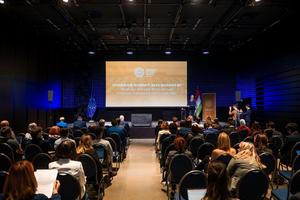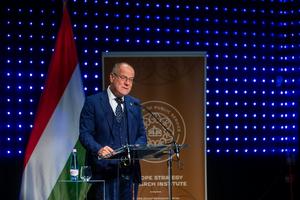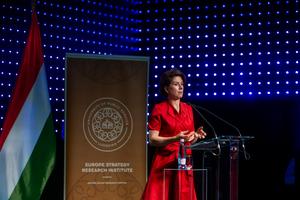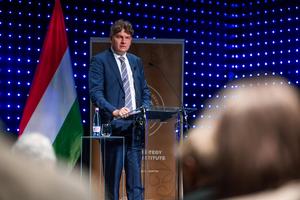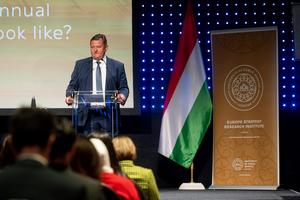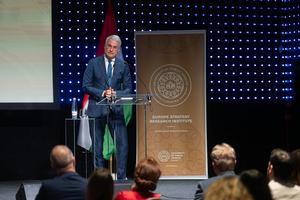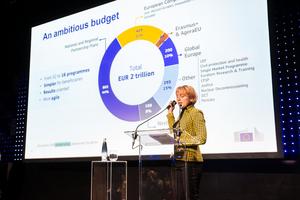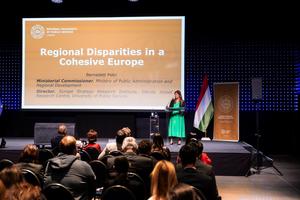On 21 Ocotber 2025 in Budapest a pivotal event about EU budget, competitiveness and cohesion, the Cohesion Summit II: What will the next MFF look like? was organized by the Europe Strategy Research Institute of Ludovika University of Public Service in partnership with the Ministry for Public Administration and Regional Development. The afternoon event was preceded by a consultation of the Central and Eastern European ministers responsible for cohesion, convened by Minister Tibor Navracsics during Hungary’s V4 presidency.
The event concluded a forward-looking exploration of cohesion policy under the lens of the upcoming MFF, focusing on how Europe can balance competitiveness and solidarity across its regions. The elaborated Hungary’s position on cohesion and competitiveness is available on Euractiv: Safeguarding Cohesion in a Competitive Europe: Hungary’s Vision
High level keynote speakers included Tibor Navracsics, Minister of Minister of Public Administration and Regional Development who emphasized that cohesion policy needs an adequate budget in the next MFF that supports the achievement of its objectives. He also highlighted the protection of the territorial approach and the “right to stay” as well as the link between cohesion and competitiveness, stating that cohesion relies on competitiveness as a driver of growth, while competitiveness without cohesion overlooks the development needs of individual regions and fails to unlock their full growth potential.
In her speech, President Kata Tüttő recalled that the Committee of the Regions had unanimously adopted a resolution the previous week calling for cohesion policy to remain at the heart of EU policies, staying a long-term, stabilizing investment tool that benefits all regions, not just the less developed ones, recognizing that every region is in transition — from Romania and Hungary to France and the Netherlands. President Tüttő concluded with a strong appeal for diversity and adaptability in Europe’s development paths: Europe must avoid exhausting its citizens in “constant acceleration,” and policies must stay rooted in local realities to maintain public trust.
Aleksander Jevšek, Slovenian Minister of Development, Strategic Project and Cohesion highlighted that while simplification of EU funding procedures is frequently discussed, in practice each cohesion period has increased paperwork and bureaucracy. He stressed the need for practical solutions, proposing that future reforms focus on simplification and democratization of fund management, drawing directly from on-the-ground experience. He emphasized that Slovenia strongly supports EU cohesion policy and will continue to work alongside other “friends of cohesion” to ensure its success.
Dragoș Pîslaru, Romanian Minister of European Investments and Projects framed the new MFF as a crossroads for EU countries, stating it can be a “blessing or a curse”, and stressed that the countries most able to speak on cohesion, its achievements, and its benefits are those that have gained the most from it over the years and have applied cohesion policy successfully. Minister Pislaru concluded by advocating for collaborative dialogue with the European Commission, highlighting trust as a key factor, in order to make the upcoming MFF a “blessing”.
Balázs Péter Molnár, Deputy State Secretary for European Policy of the Ministry for EU Affairs of Hungary presented the Hungarian position on the post-2028 MFF: Hungary supports a financial framework that truly meets today’s challenges and respects the needs of every Member State. He underscored that proven tools like cohesion policy should remain a priority, as they help close the gap between regions and ensure that no community is left behind in Europe’s development. He stressed that new conditionality mechanisms, including the “horizontal principle” linked to fundamental rights, could become political tools rather than objective financial safeguards.
Senior Economist at the Representation of the European Commission in Hungary, Liliána Zúgó highlighted that it is our common goal to make Europe stronger, so the European Commission’s proposal for the next Multiannual Financial Framework is ambitious and designed to strengthen Europe collectively. She emphasized that this proposal is being discussed in the Council and in the European Parliament as well as at the Committee of Regions and with stakeholders. She presented the structure reorganized into four main headings instead of seven, allowing easier fund transfers within priorities, and the European Competitiveness Fund with a total amount of 451 billion euros aiming to support and accelerate innovation across the EU.
Finally, Bernadett Petri, Head of Institute at Europe Strategy Research Institute, and Ministerial Commissioner at the Ministry of Public Administration and Regional Development highlighted the close connection between cohesion policy and directly managed EU programs, emphasizing that they are complementary rather than competing. She stressed that Europe’s competitiveness depends on regional cohesion, as innovation primarily happens locally—in cities and communities where ideas are transformed into action. She suggested several measures to narrow the innovation gap between less developed and well-established, innovative regions, including creating links between innovation hubs in advanced regions and those in less developed areas, complemented by mentoring and support networks.
The afternoon continued with two panel discussions. The first one, titled “The future of Cohesion – under what conditions can EU regional policy be sustained in the next financial cycle“ examined whether cohesion policy can adapt to new challenges while maintaining its core mission of reducing regional disparities.
The panel discussion, moderated by Viktória Lilla Pató, Researcher at Europe Strategy Research Institute at Eötvös József Research Center of the Ludovika University of Public Service featured Bernadett Petri, Ministerial Commissioner at the Ministry of Public Administration and Regional Development, Bence Cseke, Executive of the Hungarian Development Promotion Office, and Richárd Schenk, Researcher at MCC Brussels.
The conversation focused on the upcoming Multiannual Financial Framework, addressing regional disparities and strengthening urban–rural connections. Participants agreed that regional divides nw are harmful for the functioning of the single market, and current EU fund allocation can exacerbate these inequalities. Bernadett Petri emphasized monitoring systems and more horizontal programs as key solutions, while Bence Cseke highlighted the role of functional urban areas, where city–agglomeration cooperation can drive economic and social cohesion, following successful examples from Central Europe. Mr Schenk introduced the principles of cohesion policy from a historical point of view, while stressing that simplification is needed in the upcoming financial framework.
The discussion also stressed that without strengthening innovation and the right to stay locally, rural depopulation will continue. The panel explored the balance between cohesion and directly managed EU funds, noting the growing need for synergies between them. From a Hungarian perspective, reducing bureaucracy and reinforcing innovation ecosystems as essential, while it was pointed out that capacity gaps hinder smaller regions from catching up. The session concluded with the principle that Europe’s future should be built on complementary regional and financial cooperation rather than competition: “not compete, but complete.”
Next, a panel discussion titled “The Multiannual Financial Framework at the service of competitiveness within and beyond EU borders” analyzed how the next MFF can be shaped to strengthen Europe’s competitiveness both internally and globally.
The panel featured Gábor Kutasi, Head of the Research Institute of Competitiveness and Economy at Ludovika University; Tamás Juhász, Senior Economic Analyst at the Representation of the European Commission in Hungary; Borbála Schenk, Head of Unit at the National Research, Development and Innovation Office; and Orsolya Ráczova, Senior Analyst at Eurasia Group. The discussion was moderated by Réka Csepeli, Researcher at the Europe Strategy Research Institute, Eötvös József Research Centre, Ludovika University of Public Service.
The conversation focused on the next MFF and its potential to strengthen Europe’s competitiveness while balancing cohesion. Panelists highlighted that the proposed MFF is ambitious, emphasizing innovation, research, and strategic investment to position Europe more effectively in the global economy. Mr Kutasi stressed that while cohesion remains important, the concentration of funds on competitiveness and innovation may challenge homogeneity across regions, reflecting a shift in EU priorities.
Panelists pointed out the risks and uncertainties facing Europe, including geopolitical tensions, energy dependencies, and fiscal pressures, noting that these challenges make resilience and flexibility central to EU policy. It was highlighted that the MFF’s simplification and consolidation of funding streams provide opportunities for more coherent, strategic use of resources, though bureaucratic hurdles remain.
Innovation emerged as a key theme: panelists noted that the new framework explicitly links research and innovation to competitiveness, with ambitious funding under Horizon Europe’s next phase. However, as Ms Schenk pointed out, disparities between well-established “non-widening” and less-developed “widening” countries persist, and bridging this gap requires both EU-level programs and stronger member-state engagement.
The panel concluded on an optimistic note, emphasizing that strategic use of cohesion and innovation funds can empower regional research centers, leverage local knowledge, and ensure that less-developed regions have the capacity to compete, ultimately supporting Europe’s long-term competitiveness.
The event was hosted by Rawand Ben Brahim, Research Fellow at the Europe Strategy Research Institute of the Ludovika University of Public Service.
Text: Nikoletta Berki
Foto: Dénes Szilágyi
